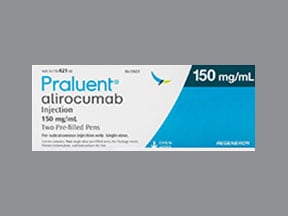
Praluent Coupons & Savings Card – Discount Prices from $265.93
My prescription
Edit
1ML of 150MG/ML, Praluent (1 Pen)
Select pharmacy

CVS
$276.57
COUPON PRICE
Walmart
$265.93
COUPON PRICE
Walgreens
$266.67
COUPON PRICE
Albertsons
$273.16
COUPON PRICEPraluent savings card
Show this card to your pharmacist
Walmart
$265.93
BIN
ID
PCN
GRP
019876
LHA4616C9D
CHIPPO
LHX
Powered by
Related PCSK9 inhibitors prescriptions
More prescriptions for stroke risk reduction
Related PCSK9 inhibitors prescriptions
More prescriptions for stroke risk reduction
Price history for Praluent
1 Pen, 1ML of 150MG/ML
Average retail price for Praluent
Average SaveHealth price for Praluent
Our price history data is based on aggregated prescription data collected from participating pharmacies in America. Our prescription data updates daily to reflect the latest price changes. If you notice a missing data point, it means there wasn't sufficient data available to generate a monetary value for that date.
*Retail prices are based on pharmacy claims data, and may not be accurate when we don't have enough claims.
Praluent dosage forms
Dosage Quantity Price from Per unit 1ML of 150MG/ML 1 Pen $265.93 $265.93 1ML of 75MG/ML 1 Pen $258.50 $258.50 1ML of 75MG/ML 2 Pens $525.01 $262.50 1ML of 75MG/ML 3 Pens $789.20 $263.07 1ML of 150MG/ML 2 Pens $531.33 $265.67 1ML of 150MG/ML 3 Pens $789.49 $263.16
| Dosage | Quantity | Price from | Per unit |
|---|---|---|---|
| 1ML of 150MG/ML | 1 Pen | $265.93 | $265.93 |
| 1ML of 75MG/ML | 1 Pen | $258.50 | $258.50 |
| 1ML of 75MG/ML | 2 Pens | $525.01 | $262.50 |
| 1ML of 75MG/ML | 3 Pens | $789.20 | $263.07 |
| 1ML of 150MG/ML | 2 Pens | $531.33 | $265.67 |
| 1ML of 150MG/ML | 3 Pens | $789.49 | $263.16 |
What is PRALUENT prescribed for?
Praluent is prescribed to help lower LDL cholesterol levels in individuals with hypercholesterolemia, particularly those with familial hypercholesterolemia or clinical atherosclerotic cardiovascular disease. It is often used in conjunction with diet and other lipid-lowering treatments.
What are the side effects of PRALUENT alirocumab injection?
The side effects of PRALUENT (alirocumab) injection may include symptoms such as itching, swelling, pain, or bruising at the injection site. Other possible side effects can include flu-like symptoms, such as a sore throat, runny nose, or cough. Some individuals may experience muscle pain, diarrhea, or an increase in liver enzymes. It is important for patients to discuss any side effects with their healthcare provider, as they can provide guidance and support.
Is PRALUENT effective without a statin?
Praluent (alirocumab) can be effective without a statin. It is a PCSK9 inhibitor used to lower LDL cholesterol levels and can be prescribed for patients who are unable to tolerate statins or for whom statins are not sufficient. However, the decision to use Praluent without a statin should be made by a healthcare provider based on the individual's specific medical condition and treatment goals.
What class of drug is alirocumab?
Alirocumab is classified as a PCSK9 inhibitor.
Can you take Praluent without a statin?
Yes, Praluent (alirocumab) can be taken without a statin. It is often prescribed for patients who cannot tolerate statins or for those who need additional cholesterol-lowering effects beyond what statins provide. However, the decision to use Praluent without a statin should be made by a healthcare provider based on the individual's specific medical condition and treatment goals.
